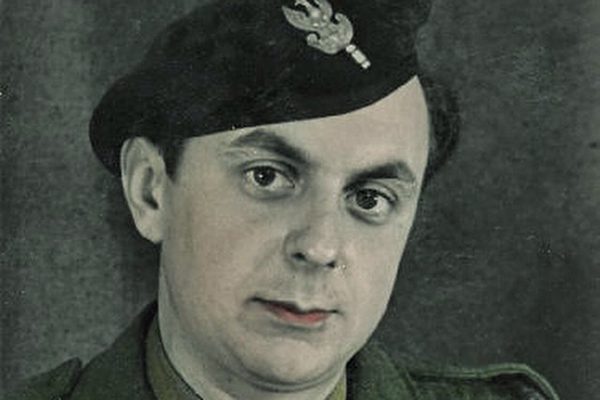Zigmund Janus

“When it comes to Grandpa Ziggy, there are several fond memories that come to my mind. My top favorite memory is listening to him tell war stories around the campfire up in the Thousand Islands during our yearly fishing trips. My second favorite memory is attending Buffalo Sabres games with him.”
– Nathan Janus, student
Ziggy Janus, remembered by his grandson, Nathan Janus
Ziggy Janus fought for the Germans and later for the British.
Born in Poland in 1925, Grandpa Ziggy had to deal with hardships at an early age. His mother passed away when he was two years old and he was eventually raised by his paternal grandparents. As a youth, he witnessed the German invasion of his hometown, Gdansk. Shortly after the invasion, Ziggy and his grandparents became refugees. After living for a few months at a refugee camp, Ziggy’s grandmother wrote to the Germans, asking why the family was displaced when she had two sons fighting for the Germans. It did not take long for Ziggy and his grandparents to return back home to Gdansk.
When Ziggy was 17 years old, he was “drafted” into the German Navy; a do-or-die scenario. He served on a Flower Class Corvette ship that the Nazis commandeered from the French during the Battle of France. During his year and a half at sea, Ziggy’s job was to supply the ammunition to the large guns.
Ziggy and his crewmen saw action during the D-Day Invasion in Normandy. Because his ship was a smaller vessel, it could not compete with the artillery of the larger Allied warships. As a result, Ziggy’s ship was forced to wait out the invasion in the harbor in Le Havre, France. A week after the D-Day invasion, the Allies bombed the German warships in Le Havre, including Ziggy’s ship.
Thankfully Ziggy was able to escape the bombing. The Allies came during the night to bomb the harbor. At the time, Ziggy was at his post, patrolling the boat. He heard the Allied aircraft above and tried to warn one of his fellow sailors, who ignored Ziggy. After returning to his post, he heard a voice telling him to get off the ship. Not seeing anyone, he took it as a sign of divine intervention. Minutes after abandoning his ship, it was bombed, and sank to the bottom of the harbor. Of the 72-man crew, eight sailors drowned.
After the bombing, Ziggy was sent to a German infirmary to be checked out. After getting a clean bill of health, he was released. With no ship to return to, he was transported to a German Army post outside Paris. Ziggy tried to make the best of his situation. He learned to fish for eels with grenades and he even met a Polish girl, Aniela, who lived in town.
As the war waged on, Ziggy grew tired of it, and not wanting to fight for the Germans in the first place, he decided to defect. He found the perfect opportunity when his battalion received orders to retreat to Berlin. Late one afternoon, on the eve of the retreat, Ziggy, armed with his service rifle, hid in an old abandoned water tower on a small island by his post. Eventually, a pair of Germans from his post came looking for him, but they never found him.
During the night, Ziggy left the water tower and made his way into town. He went to Aniela’s house; she lived on the second story of a building. To get her attention, he threw pebbles at her window. She quickly brought him inside and hid him. The following day, the Germans began their journey back to Berlin.
Ziggy stayed with Aniela for a short period of time. She found him asylum outside of town in a Russian working camp. While he was there, the Polish Exile Army came looking for him. Not wanting to fight any more, Ziggy stayed quiet, and the Polish Exile Army left. It turned out that Aniela had contacted the Polish Exile Army. She was looking after Ziggy and wanted to keep him safe. She figured anywhere but Paris (and Germany) would have been better for Ziggy. A couple days later, the Polish Exile Army returned to the Russian working camp and picked up Ziggy.
Before he knew it, Ziggy was being transported by truck from Paris to Le Havre and then to London. After going through another physical and a round of boot camp, Ziggy was suited up to fight with the British. Ziggy, along with other Poles, was transported by train to Scotland to receive more military training. He was placed in an anti-aircraft platoon and later volunteered to become a truck driver and mechanic for the service.
After the war, Ziggy spent a few years as an automobile mechanic before coming to the United States. His life story was documented in his book, “Estelle & Ziggy.” Grandpa Ziggy passed away at the age of 92 on April 13, 2018.